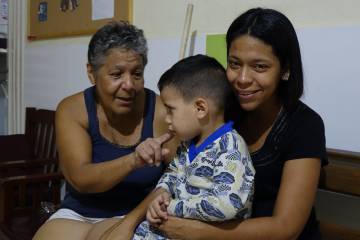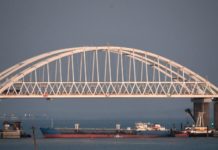Humanitarian crisis looms as flow of Venezuelans into Colombia continues
Claudi Pérez
Living conditions are tough in border town of Cúcuta, across from the Simón Bolívar bridge.
“Imagine a city the size of Barcelona that was relatively rich a few years ago but which now has no food in its supermarkets, no medicine in its hospitals, and where protesters are persecuted: that’s what we’ve escaped,” says Susana Guevara, one of the thousands of Venezuelans who have fled the country.
Food insecurity affects 90% of Venezuelans
At the end of last year, she left Caracas with her mother and two children: three-year-old Ángel Gustavo and five-year-old Ángel Gabriel. The youngest shows signs of malnutrition, the eldest has leukemia and rickets. “That’s why we came. There was no medicine to treat him,” explains Guevara. “And because the political repression is unbearable,” she adds.
Guevara is a radiologist who began to protest the political situation in Venezuela when she was 17 years old. She was arrested multiple times. Then one of her kids was kidnapped. That was the tipping point. She left her house “with a poorly packed suitcase quickly thrown together, almost without savings.”
She left behind her husband, a supporter of President Nicolas Maduro and his predecessor Hugo Chávez. After a 30-hour journey, she arrived at the Simón Bolívar bridge at the border between Venezuela and Colombia. She crossed into Cúcuta and joined the nearly one million Venezuelans who fled to Colombia last year.
The reasons to leave are compelling: eight in 10 Venezuelans live in chronic or severe poverty. Hyperinflation has eaten away at their savings and salaries. GDP has fallen by 40% in the past three years. Food insecurity affects 90% of the people. There’s not enough medicine or doctors – 6,700 physicians are among those who have fled. And above all, they are scared. “The government has been repressing dissent through often-violent crackdowns on street protests, jailing opponents, and prosecuting civilians in military courts,” reads a UN report on Venezuela.
 Susana Guevara (R) and her son in a shelter in Cúcuta, Colombia. Ruth Silva
Susana Guevara (R) and her son in a shelter in Cúcuta, Colombia. Ruth Silva
Every day, around 4,000 Venezuelans cross the Simón Bolìvar bridge into Colombia in search of a better future. Many will never return. But on the other side of the border, things are not much better.
“In the beginning we rented a room but our money ran out and we lived in the street until a shelter took us in,” recalls Guevara, whose plan is to get to Peru where she believes her son will be able to receive proper treatment.
In Cúcuta, unemployment is at 16.5% and the informal economy is over 50%. Public services are stretched thin and there is incipient xenophobia against Venezuelans. Making matters worse, Cúcuta is a hub for drug trafficking and listed as one of the 50 most violent cities in the world as guerrillas and paramilitary groups continue to clash.
The political repression is unbearable
Venezuelan Susana Guevara










